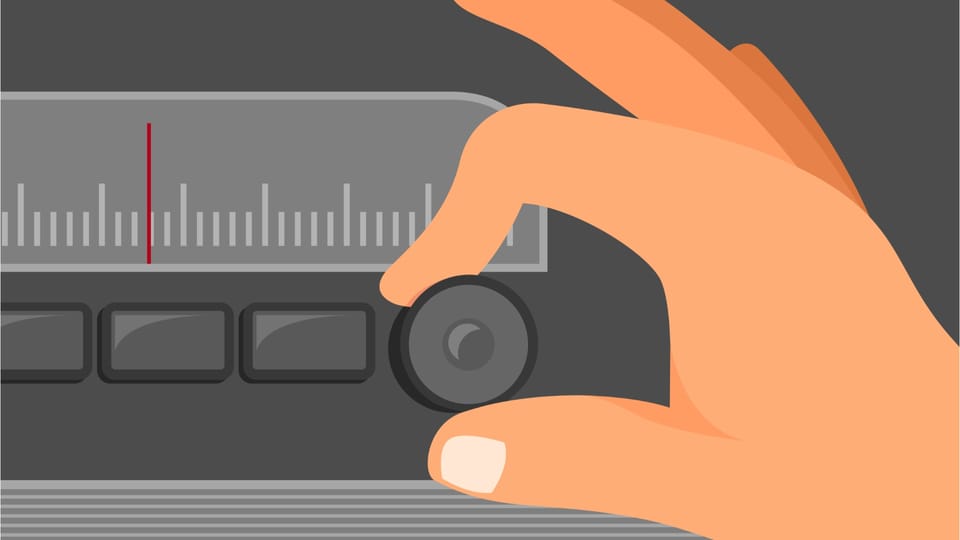Toolkit for Life: Tuning (Luke 10:38-42)

Earlier this year, Ed and I received an e-mail from someone in our church with the subject line “Overloaded.” The e-mail got my attention. Listen to what it said:
I’m spiritually dry and mentally exhausted. I figured out why I’m feeling weary and burned out. Eek. This is TOO MUCH.
Why in the world am I offering to do MORE, or agreeing to add new responsibilities before dropping old ones? That’s crazy.
If Richview was a job, the HR department would be telling me to take a leave of absence, or at least book some time off since I haven’t had a holiday in four years.
So. In answer to recent e-mails [to join other ministries], no!…
Furthermore, if the discussion at Frontline was any indication, I’m not alone. This is a problem for many of the people who were at that meeting, including (especially!) for the two of you.
So… what can be done? Because it seems clear that SOMETHING should be done.
“Something should be done.” I think that’s right. The person who wrote this e-mail isn’t alone. Yesterday, I talked to somebody else who told me, “I have to say no from now on. I keep saying yes when asked to serve, but from now on I can’t. I’ve reached my limit.” If we opened the floor, we could probably have testimonials of people who are feeling this way – overloaded, stressed, and stretched to the limit.
See how you compare to this survey of Americans who were asked if they would say:
Need more fun: 68
Need a long vacation: 67
Often feel stressed: 66
Feel time is crunched: 60
Want less work, more play: 51
Feel pressured to succeed: 49
Feel overwhelmed: 48
It’s obviously not a lot of fun to live this way, but the problems go deeper. According to Jesus, we put a lot more at risk than our mental health when we live with overload.
The Real Problem with Busyness
If you have a Bible with you, let’s look at Luke 10 together. Luke 10 contains some stories that are pretty familiar to a lot of us, but we may never have seen them put together before in a way that gets at the problem.
Luke was a careful storyteller. I’ve often read the stories in the Bible as if they’re written in some random order. Most of the time, I’ve assumed that we’re just reading a chronological account of what happened. Many times, it helps to look at what happened before and after each story. There’s usually some connection, and it helps figure out how it all ties together. I’ve never realized before that part of what Jesus is talking about in this chapter is busyness.
In this case, the story starts with someone asking Jesus, “Teacher, what must I do to receive eternal life?” (Luke 10:25). Jesus asked him to answer the question from the Scriptures:
The man answered, “‘You must love the Lord your God with all your heart, all your soul, all your strength, and all your mind.’ And, ‘Love your neighbor as yourself.'”
“Right!” Jesus told him. “Do this and you will live!” (Luke 10:27-28)
If you want to reduce all the commands in the Bible down to two essentials, these are the two: loving God, and loving others. This is sometimes called the Great Commandment. Everything else is window dressing. This is the essence of what it means to follow God: love him, love others.
What’s interesting is what comes next: two stories in which people fail to love God and love others. The first story is about a failure to love people. You may know it as the story of the Good Samaritan. A man is beaten and robbed. A couple of people who could help don’t because – you guessed it – they’re too busy. Wayne Jacobsen writes, “What if the priest and Levite passed by the beaten man on the Jericho road, not because they lacked compassion, but because they were running late to a discipleship group or an important board meeting?” Busyness, even for the most holy of reasons, can cause us to break the Greatest Commandment. We can’t love others when we’re too busy.
The next story is about our failure to love God. The culprit, again: busyness.
Get the picture here? We’re taught that the most important commands to obey are the commands to love God and love our neighbor. This is followed by two stories in which people fail to love God and love their neighbor. The common problem in both: busyness.
Busyness is more than a stress problem. Busyness does more than make relationships more difficult. The danger of busyness is not just the toll that it takes on our bodies and the exhaustion that it causes. The real problem with busyness is that it becomes a disobedience issue. Busyness can lead to a failure to keep the Great Commandment: love God and love others.
This is a good reality check for most of us who are, if we’re honest, busy. This takes busyness out of the “lifestyle improvement” column and into the “faithfulness” column. That’s why we’re talking about it today. If we’re going to live faithfully, we need to realize that busyness keeps us from being faithful in the two commands that matter most. Busyness is the enemy of the soul.
This isn’t just theory. In 1973, a group of theology students was told that they were to go across campus to deliver a sermon on the topic of the Good Samaritan. As part of the research, some of these students were told that they were late and needed to hurry up. Along their route across campus, the researchers had hired an actor to play the role of a victim who was coughing and suffering.
Ninety percent of the “late” students in Princeton Theology Seminary ignored the needs of the suffering person in their haste to get across campus. As the study reports, “Indeed, on several occasions, a seminary student going to give his talk on the parable of the Good Samaritan literally stepped over the victim as he hurried away!” Busyness keeps us from loving God and loving others.
Second Tool: Tuning
Slowing is an important part of our obedience, but it’s not enough. There’s a second skill that’s needed. Tuning is essential if we are going to love our neighbors and love God.
Every day we’re barraged with information. The newspaper arrives before we get up. The computer has a stack of e-mails that arrived while we were sleeping. The radio and TV blast us with commercials. The billboards are bigger than life. We’ve got voice mail, junk mail, e-mail, snail mail. Information comes at us 24/7. I Googled “information overload” and it came back with a quarter of a million results. There is way too much information out there competing for our attention.
It’s not easy to tune into what’s important. With all the noise and demands, we tend to tune into whatever is most urgent, or whatever is loudest. Whatever we tune into gets our attention and sets the agenda for our life. Tuning is more important than we could ever imagine.
Luke 10 contains a story about tuning. “As Jesus and the disciples continued on their way to Jerusalem, they came to a village where a woman named Martha welcomed them into her home” (Luke 10:38). Most of us have had people over to our house, and we know that entertaining is very stressful. We don’t know the details of this visit. Maybe it was arranged beforehand; maybe they just popped in. There probably would have been at least fifteen people present. I don’t think that I have ever cooked for and entertained that many people all at once. I’ve entertained a lot less and been frazzled.
For Mary and Martha to have Jesus and his disciples over was a big deal. A woman’s honor and reputation depended on her ability to manage her household well. Service was considered a woman’s highest calling in that day. You don’t just have a bunch of people over in that culture – never mind Jesus – without sweating the details a bit. The food doesn’t cook itself.
“Her sister, Mary, sat at the Lord’s feet, listening to what he taught. Martha was worrying over the big dinner she was preparing” (Luke 10:39-40). Martha was going crazy trying to get everything ready. There weren’t any microwave ovens or prepared foods. Everything was made from scratch. I can barely even cook for a whole bunch of people with the conveniences that I have. I wouldn’t have a hope doing what Martha was doing all by herself.
If you want to criticize anyone in this story, Mary is the easy target. While Martha was working, Mary was sitting at Jesus’ feet and listening to his teaching. We aren’t shocked by this, but it would have been completely shocking back then. To sit at the feet of a respected rabbi was the position of a disciple. No rabbi at the time had a female disciple. Girls at that time did not receive a formal education; they were taught only household duties like sewing and weaving. Jewish tradition said, “If any man give his daughter a knowledge of the Law it is as though he taught her lechery.” It was completely inappropriate for Mary to be sitting at the feet of Jesus learning at that time. It went against everything in that society.
“She came to Jesus and said, ‘Lord, doesn’t it seem unfair to you that my sister just sits here while I do all the work? Tell her to come and help me'” (Luke 10:40). I don’t blame Martha. There was nothing wrong with what she was doing. Where would be without the people like Martha?
So you have two things at work here. One, Martha isn’t getting the help that she needs to carry out her obligations. Two, Mary is going against every expectation about how she should behave.
Listen to how Jesus responded: “But the Lord said to her, ‘My dear Martha, you are so upset over all these details! There is really only one thing worth being concerned about. Mary has discovered it-and I won’t take it away from her'” (Luke 10:41-42).
Jesus didn’t blame Mary. He didn’t tell her to get back into the kitchen and to learn her place. Instead, he praised her, saying that she was tuned in to what was important.
This seems like it’s thousands of years and thousands of miles away from us, but it’s not. We face the same issues today, the same choices that faced Mary and Martha.
Noise – I’ll admit it, I get distracted by the noise of a full house. I see what needs to get done. I am driven by the noise – by my to-do list, by what I’ve got scheduled. Noise is what’s going on around us. It’s all the distractions around us. It’s the TV, the radio, the phone. It’s always being connected. It’s all the stuff we need to get done, all the things we’re listening to. Martha made a choice to tune into the noise. Mary made a choice to tune into Jesus instead of the noise.
Tuning involves reducing the noise. It’s letting the dishes stay stacked, the laundry sit unfolded. It’s leaving some items unchecked on your to-do list. It’s unplugging from the Internet and turning the radio and television off. It’s getting rid of everything – even good things – that distract us so we can hear the voice of Jesus.
Mary was somehow able to tune out the dishes that needed to be cooked and to sit down at the feet of Jesus.
The louder life gets, the more noise we hear, the more we need to unplug, shut everything down, and sit at God’s feet. The more noise we have in our lives, the more we need to take the deliberate step of tuning out that noise and listening to Jesus.
One way to tune noise out is to practice the one-dish rule. Martha was preparing all kinds of dishes. Really, one dish would have been enough. Jesus said, “Only one thing is needed” (Luke 10:42). One way to tune out the noise is to simplify, to do less. Simplifying what we do is an excellent way to make room to listen to Jesus.
I don’t know what will work for you. Sometime, somehow, we need to figure out what will work for us so that we can shut out all the noise and sit at the feet of Jesus. What will work for you?
Expectations – Tuning means reducing the noise. It also means ignoring expectations. Mary learned from Jesus because she refused to be confined to the women’s quarters. She went against all the expectations of the day and broke all the expectations.
Jesus welcomed Mary as his disciple. He broke the expectations of the day. Tuning means that we ignore the expectations people have of us if it will take away from our time with Jesus. The expectations might be self-imposed. They may come from people at the church or from work. There was nothing wrong with what Martha was doing, but Mary chose not to allow the expectations to take her away from Jesus. We may need to take a time out from the expectations that others have of us to spend some time with him.
There’s a word that can help you say no to the expectations of others when you need to slow and tune. It’s an easy word, but one that we need to master: No! If you have a hard time saying no, then say, “No, thanks.” Jesus modeled the way for us. He didn’t let others define what He would do. Even when the pressures were intense, Jesus got away from those who needed Him and spent time with God.
Tuning involves reducing the noise, ignoring the expectations, and learning from Jesus.
The problem with busyness is that you can’t be busy and love God and love people. Busyness is the enemy of the soul. We’re working harder than ever. There’s more to read and more to do than ever before. We can barely keep up. In a world that keeps going faster and faster, Jesus invites His people to unplug, to ignore the rising expectations that try to convince us to do anything but to sit at the feet of Jesus. He invites us to find a way that fits our personality and will work with our schedule so we can sit and learn from Him. Most of us could use a bit more Mary and a little less Martha.
Jesus said, “There is really only one thing worth being concerned about. Mary has discovered it-and I won’t take it away from her.”
God desires a relationship with you, far more than He values anything you could do for him. Two of the tools that are essential to being – not just doing – are to slow the speed of life, and then to tune into God. Jesus Himself took time away from the noise and the expectations to connect with God. If He needed to tune, it’s a sure thing that we need to tune into God as well.
The more that life speeds up, the more we need to take the deliberate steps of slowing and sitting at the feet of the One who is with us all the time, and who wants a relationship with us. The more noise in our outside world, the more we need a quiet center, an inner core that’s still.
So what noise do you need to tune out? What expectations do you need to ignore? What will work for you in terms of tuning into God – a quiet morning appointment with a cup of coffee, a walk in nature, a CD, some time before you go to bed? If we’re going to live a life of faithfulness to God, slowing and tuning are two essential tools that we need to learn.





